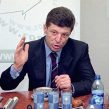
KREMLIN HOPES LEADERSHIP CHANGE WILL IMPROVE SITUATION IN KABARDINO-BALKARIA
Publication: Eurasia Daily Monitor Volume: 2 Issue: 177
By:

On September 16 Dmitry Kozak, the Russian presidential envoy to the Southern Federal District, announced that Valery Kokov, president of the Kabardino-Balkaria republic, had resigned due to poor health.
Kokov had led the region for 14 years, first as the local Communist boss in Soviet times, then as the republic’s president. While the situation in other Caucasian regions is deteriorating daily, Kokov’s republic was long a symbol of stability and calm. In 1996 Kokov successfully resolved the republic’s most serious political crisis, which arose when the Balkars, a minority in the region, tried to proclaim an independent republic in the south. Kokov managed to cut a deal with the Balkar elite by making some concessions. Suphyan Beppaev, the Balkar separatist leader, was appointed a presidential human-rights advisor to assure that the rights and interests of the Balkars were not violated (Kommersant, September 19).
But nearly ten years on, neither the local population nor the Russian authorities were satisfied with Kokov’s rule. Travel to Kabardino-Balkaria is like stepping into a time machine. The republic seems stuck at the end of the 1980s. “The resignation of Kokov was a foregone conclusion, because the social and economic situation in Kabardino-Balkaria is close to disaster,” said an unnamed source in the Kremlin. Gazprom and Unified Energy Systems, the Russian state-owned gas and power giants, constantly cut off gas and electricity supplies to the region because of huge payment arrears. A large ore-processing plant in Tyrnyauz, formerly a major source of revenue for the local government, cannot function properly because the tug-of-war between the Kabardinians and the Balkars frightens away potential investors (Kommersant, September 19).
According to a recent Caucasus Times survey in Nalchik, the capital of Kabardino-Balkaria, economic problems worry almost the entire population (95%) and 44% of residents are concerned about security in the republic (Caucasus Times, September 19). The appearance of a local insurgency, a Yarmuk rebel group, in 2003 has made the situation even tenser. The Islamic rebels made their presence known recently by attacking an army patrol in the outskirts of Nalchik, killing one soldier and injuring another (RIA-Novosti, September 18). Alongside the rebel attacks, police special-forces units conduct endless mopping up operations in the mountain districts and rural areas of the republic.
The Kremlin needs a new leader to keep Kabardino-Balkaria from descending into chaos. One year ago Russian President Vladimir Putin pushed forward new legislation whereby he would appoint the heads of regional executive branches, rather than continuing with elections. The local parliament would get to approve the presidential nominee.
Thus on September 19 Kozak went to Nalchik for consultations. He gathered heads of parliamentary committees, civic groups, major political parties, and spiritual leaders to discuss possible candidates to replace Kokov. The meeting was held behind closed doors; journalists and even ordinary deputies from the local parliament were excluded (regnum.ru, September 19).
Kozak proposed two candidates: Arsen Kanokov, a Kabardinian businessman and deputy to the Russian State Duma, and Gennady Gubin, the prime minister of the republic and a member of Kokov’s inner circle.
Local leaders also advanced their own candidates. Representatives from the Balkar national movement proposed Khachim Karmokov, a deputy to the Russian Federation Council. Leaders of the local communist party suggested Akhmedkhan Panezhev, who heads the Kabardinian branch of Gazprom (Kavkazsky Uzel, September 19). According to news reports, everyone at the meeting agreed to submit the names of all four candidates to Putin.
But just after the meeting Kozak told journalists that he would make the decision about which names to forward to Putin within two days. He also said that it would take approximately one week to get the Kremlin’s final decision (Interfax, September 19). On the same day, the official Itar-Tass news agency reported that Putin’s envoy had already chosen the two leading candidates for the regional presidency, Kanokov and Gubin, the two “that he himself had proposed in the first place” (Itar-Tass, September 19).
Apparently the meeting in Nalchik was just for show. It was intended to give a semi-democratic veneer in which to package the Kremlin’s pre-selected candidate. Most Russia analysts suggested that it would be Kanokov. “Kanokov has been living in Moscow for a long time and got away from the principal clans in Kabardino-Balkaria,” said Alexei Malashenko of the Carnegie Moscow Center. “That is why he will listen more to signals from the center than to demands of the local elite” (Gazeta, September 19). Ruslan Kamoev, a member of the Institute of Humanitarian Research, agrees with Malashenko: “Politically, Kanokov is closer to the party of power [Kokov’s team], moreover he is well-known in the republic” (Nezavisimaya gazeta, September 19).
Russian TV channels have already started to market Kanokov, describing the many good things he has done in Kabardino-Balkaria. Reporting about the meeting to discuss candidates for the presidency, the NTV correspondent casually pointed out that Kanokov had funded the construction of the central mosque in Nalchik (NTV, September 19).
Clearly, the candidates proposed by the local elite have no chance at winning the republic presidency. The Kremlin selects only candidates who are loyal to it and nobody else. The Russian government hopes that such a candidate would be able to pursue the Russian version of checks-and-balances, meaning not letting any one clan or ethnic group gain an upper hand in the republic.
The Kremlin believes that ethnic conflicts and clan power struggles are the main reasons for the instability in the whole North Caucasus. However, nobody can explain how anyone with strong links to Kokov’s party of power could be a neutral arbiter. It is quite possible that Kanokov will replace Kokov only; the latter’s team and more importantly his policies will be unchanged. In this case, there will not be any great changes in the republic in the near future.




